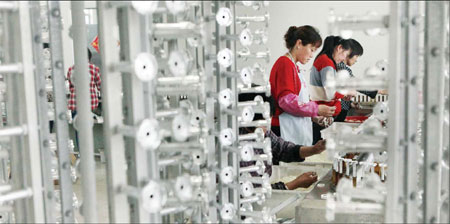Chinese firms face trust deficit
Updated: 2013-09-20 16:29
By Zheng Yangpeng (China Daily)
|
||||||||
|
 Many Chinese companies are going abroad, but they have work to do in gaining the confidence of potential customers. Provided to China Daily |
There is a wide gap between the trust China's multinational companies enjoy at home and the way they are perceived abroad, a survey has found.
In the survey, conducted by the global public relations firm Edelman, 83 percent of respondents in China said they trust the companies, a figure that fell to 50 percent in emerging markets and 24 percent in developed markets.
The level of trust in Chinese corporations in developed markets is lower than for companies based in South Africa and India. Nearly 31 percent of the respondents in developed markets said they trust companies based in South Africa, while 28 percent trust companies from India.
Of the respondents in all the nine surveyed countries, companies headquartered in India had a 38 percent trust rate. Companies headquartered in Brazil had a 47 percent trust rate, while those based in China had a 37 percent rate.
China-based companies rate particularly low in Germany (19 percent), France (22 percent) and the United States (26 percent), according to the survey, for which 5,400 people from both developed and emerging nations were interviewed.
The seven attributed the trust deficiency mainly to low brand familiarity and sensitivities about state involvement. Respondents in developed markets believe that companies from the emerging markets have close ties with their national governments.
While respondents in developed markets have a 50 percent trust rating in listed companies, only 37 percent trust state-owned companies.
Richard Edelman, president and chief executive officer of Edelman, says people in developed markets are increasingly nervous about Chinese companies entering their markets.
Only one-third of the respondents in the developed markets are willing to see a Chinese company buy a company in their countries, and only 38 percent want a Chinese company to make a major investment in a new plant or office in their home countries, he says.
"This is a big problem. 'Branding China' is not helping if Chinese companies want to go global."
However, there are a few Chinese companies that are exceptions. Technology firm Lenovo Group enjoys a 72 percent consumer awareness level in the US, while airliner Air China enjoys a 63 percent rating. These levels are higher than most of the other companies in the emerging markets.
Infosys Technologies, an Indian IT company that had the third highest trust rate in the US among all emerging market-based companies, had a 36 percent awareness in US, far behind that of Lenovo and Air China.
Brain says one possible explanation for this is that Chinese companies are perceived to be state-controlled, as against those in India and South Africa.
As a result, there is less trust in Chinese companies in major markets. For instance Chinese telecom companies often face rough weather in India over issues like data security.
Wang Jianlin, chairman of Dalian Wanda Group Co Ltd, a Chinese real estate company that has expanded aggressively in overseas markets recently, says the trust deficit is "normal" because corporations in emerging markets are still in the early stages of development.
Speaking at the World Economic Forum Annual Meeting of the New Champions in Dalian, Wang said his company's overseas expansion, including the acquisition of US cinema conglomerate AMC Entertainment last year, had never faced any trust issues. Wanda had discussed the move fully with AMC executives before seeking shareholder approval, he said.
The survey also found that in developed markets, the most common perception of China-based corporations is that they lack transparency and openness. Developed-market respondents also think that Chinese companies have failed to produce high-quality products and act responsibly in a crisis.
David Brain, Edelman Asia-Pacific president and chief executive officer, says companies will pay the price if they fail to respect employee rights and protect intellectual property rights.
"Trust is money. Low trust among customers will surely lead to artificially low valuations in initial public offerings, or delays or failures in overseas acquisition."
While it is natural for consumers in developed markets to cast doubts on emerging market-based companies, there are still doubts as to why China, a much more potent economic power than India, South Africa and Brazil, has failed to win favor in developed economies.
Hellmut Schutte, dean and vice -president of China Europe International Business School, and an expert in international corporate management, says emerging economies such as India have also failed to win trust from developed markets in most of the general fields.
"It might be that in certain industries, certain countries have got an image which is better than their average image. India is highly recognized in IT as it has several good companies, but in the rest of the areas India has no reputation at all," Schutte says.
"Developing countries do not have a good image of companies from other emerging markets," he says.
China should look at why many Indian companies have been successful, he says. One reason could be the international management experience of many Indian professionals.
"There are a lot of Indian talents in international firms. Of course this has something to do with the language. But it also has a lot to do with their familiarity with the global market. Top-tier Indians are very worldly. You see them in many American companies. There are many Indian managers who are CEOs of US firms. This is something that you will rarely find in the case of Chinese professionals," he says.
Most Viewed
Editor's Picks

|

|

|

|

|

|
Today's Top News
11 shot in Chicago park
UN lauds China on food waste efforts
Wang and Kerry meet in DC
Belgian zoo owner set to host Chinese pandas
Fast-track process sees more NGOs
Beijing sends out positive smoke signals
Pushing kids up the pecking order
Tougher penalties for travel agencies
US Weekly

|

|













